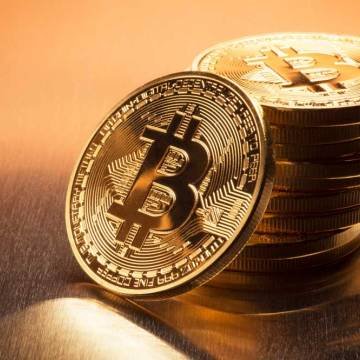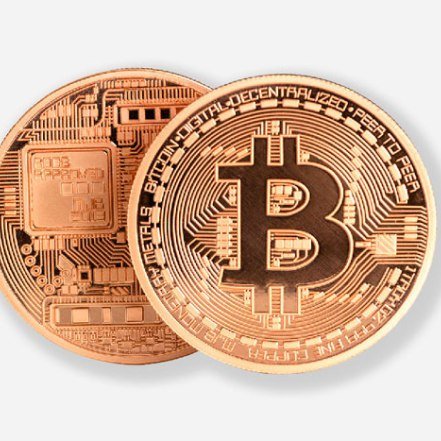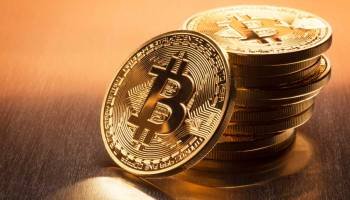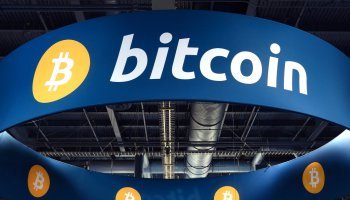It is time to unveil The Truth About Bitcoin for which I think it’s really important to take a few minutes to understand the future of freedom, I would argue, which is Bitcoin and old coins and related to digital currencies.
Why is this important?
I would argue that it’s important because fundamentally, control over human beings used to be direct control over them, like they were slaves or they were serfs.
What’s happened is the people who are in charge of society, the people who run society have found it much more profitable and a better camouflage to control money, and through the control of money they can control people.
So like an amateur thief will stick a gun in your ribs and demand your wallet, but a really sophisticated thief will control the Central Bank and print money for his use and his friends’s use and then stick you with the results and inflation and have you blame the poor helpless shopkeeper who is forced to raise prices because that’s an overprinting of money.
There doesn’t seem to be any particular end to this problem of fiat currency, central banking, government control of money and interest rates and the resulting control of human beings.
Hundreds of fiat currencies have been around throughout history. They’ve all hit the same disaster with, I guess, the exception of the British Pound which has only lasted only about 96% of its value since it was first introduced a few hundred years ago.
So I think it’s really important to understand what digital currencies are, how they operate, and why they’re so important.
So we’re going to focus a little bit on Bitcoin here. There are some other stories that we’ll talk about as well.
What is a Bitcoin?
A Bitcoin is a networked cryptocurrency. Now, crypto sounds cryptic.
It just means that it is cryptography. It’s based on the cryptography branch of mathematics or the hiding of particular information in special codes. Bitcoins are transmitted from one Bitcoin address to the next in any amount desired with zero cost overhead.
You can apply a small cost overhead if you want in the terms of pennies, to have it transact a slight amount faster but it is free.
Bitcoin addresses are identified by a string of 32 random numbers and letters just like a bank account number. Users can have one or many Bitcoin addresses. You can create a new Bitcoin address for every transaction if you want.
If you want to know how to use Bitcoins, it’s very, very simple. You can just google it and there it is.
Bitcoin is a software. Like an email client, you download it and install it on your local computer or device and you can send and receive Bitcoins. The Bitcoin software is designed and written by developers who are publicly known from around the world, and changes are made to the software over time based on fixes and features that are in demand by a consensus of users.
No one person or authority can enforce changes. You see how it’s not hierarchical, not centrally controlled; it is a voluntary participation of like-minded and talented people to produce something of great value to the world. Now, unfortunately, for those of us who like freedom, Bitcoin has a lot of qualities that government regulators don’t like and it doesn’t have qualities that government regulators do like which is why it’s going to be a challenge and an exciting challenge to get it adapted in a more widespread way.
So, how does a Bitcoin come to existence?
Well, it’s called mining. What happens is you set up a computer, a series of computers particularly with good graphics cards to solve mathematical equations.
A lot of permutations of these equations have to be solved to find the right solution, and this serves as proof of work performed by this miner. The miner is the machine or the person who’s running it. It’s like you expend the energy to dig into the ground to extract gold and that’s called mining, and in the same way you expend computer power and CPU cycles and electricity to create a Bitcoin, to mine a Bitcoin. Both require the consumption of resources. The processing power of computers that are actively involved in currently mining for Bitcoins is estimated to be 6 to 8 times greater than the top 500 supercomputers combined.
Let’s have a look at the fees. Recently, somebody transferred $6.5 million in Bitcoins for a fee of 6 cents. That’s a lot of zeros with a 9% in terms of fees. Let’s compare that to PayPal. PayPal typically charges 2.9% plus a 30-cent fee per transaction, bank wire transfers, charge runs 3.5%, takes three and a half business days to clear. If you’re looking at something like Visa you’re looking at similar kinds of amounts.
So to do this, transfer over PayPal would have cost $188,500. To do a wire transfer would have cost over a quarter million dollars.
Bitcoin can do it for 6 cents. How do you feel if you’re a bank looking at this competitor on the horizon and it’s not to the next call you make going to be to your personally rented congressman to write, interfering legislation into this kind of stuff?
There are third-party websites. It’s an open API such as Coinbase and BitPay service, and they aim to make merchant transactions simpler and link Bitcoin accounts to legacy bank accounts. They charge 0% to 0.99% for transactions. Bitcoin transactions are irreversible so there’s less risk to senders of fraud or chargebacks and this is important.
The reason that they’re not reversible is:
If you want to send someone back, the Bitcoins, since it cost you nothing, if you want that option, since it cost you nothing, you send it back. Somebody sends you a Bitcoin by accident or you run or reverse the transaction, you send them the Bitcoin back because it’s not this overhead of transaction fees. You can just do that very easily.
You can put escrow services which means that you basically put your Bitcoin into a holding cell until a particular condition is satisfied, like some good is delivered or some service is provided and then it’s released.
Transactions anywhere in the world are generally confirmed within ten minutes regardless of the size of the transaction. It’s possible to have confirmed the transaction within moments by introducing trusted intermediaries and off-chain transactions that are validated by third parties rather than by the Bitcoin network. So if you’re doing something incredibly time sensitive, then you can, of course, accelerate it.
Now, highly regulated money services like PayPal have been unable to connect foreign marketplaces, really remote places. Bitcoin permits those with an internet connection of any kind previously in isolated areas to send and receive wealth, creating a truly global marketplace.
Look, I use PayPal, but they have to conform with a huge amount of government regulations and legislations, which is what drives their price up to some degree.
Bitcoin is often described as friction-less because of the lack of need for intermediaries, the low or no fees and the speed. The authenticity of transactions are double checked and assured by the rest of the network. One measurement of the authenticity of transactions is measured by the bricks index which estimates that approximately $500 million would be required in order to trick the network and create fake transactions. They’re not too likely.
I’m sure there’s better use for half a billion dollars like funding the US government for a pound eight nanoseconds.
Now, of course, Bitcoin is not the only pony in the show. The blueprints for Bitcoin are open source. People can make their own modified versions of Bitcoin but different properties often referred to as old coins. This opens up the Bitcoin currency to competition which is kind of what you want in order to keep it moving ahead and becoming as efficient and friendly as possible. If any fundamental problems with Bitcoin are discovered in the future, then you can just switch to a new or existing old coin and there are dozens already traded on exchanges.
The top five in terms of market cap are ethereum, FeatherCoin, Terracoin, Namecoin, and Novacoin. So you may have a question. It sounds like a whole bunch of digital burping, bleeps, and bloops, and blurps.
 Is it real money?
Is it real money?
Well, that’s a question. Let’s go back in time to our good friend, shaggy face ZZ Top Aristotle dude. Of course, as you probably know, many, many different things have been used as money throughout history from corn shells, to salts, to buffalo hides, to beaver pelts, and so on.
What is money?
Well, Aristotle defines the sound form of money in terms of durability, it’s got to last.
Portability, you got to be able to carry it like if you want to pay for a car in iron, you’re not going to need a couple of tons at least.
Divisibility, can you divide it without losing its value, right? You can cut a gold bar in half, and it’s worth half a gold bar. But if you cut a diamond in half, it’s worth a whole lot less. And does it have intrinsic value?
Gold, of course, is popular because you can use it for jewelry. Now, of, course, you can use it for industrial manufacturing and so on. Other important qualities for money: fungibility, not just something you have to dig out from between your toenails, but what it means is that if you lend someone ten bucks and they give you back a different $10 bill, you don’t care. Whereas, if you lend someone your car and they give you back a different car, that might bother you a little. So fungibility and scarcity is really, really important.
So in terms of fiat currency — because what you want to do is not necessarily compare Bitcoin to gold. I mean, we can do that, but it’s important to compare Bitcoin to existing government issued fiat currency which is backed by nothing, can be printed at will, relies on debt, and all these other awful things. Okay, dollars are durable. They are portable. You can divide them. They have no intrinsic value. They’re fungible and they’re certainly not scarce. You don’t even need to print them anymore. You can just type them into the Feds bank account and bingo bango, bongo, you’ve made yourself some wealth and enslaved yourself some poor people.
Is it real money?
Well, it certainly is more real than Federal Reserve notes. It’s more real than the ass wipe paper towels of money printing extravaganzas known as modern government currencies. Bitcoin has all these qualities. It doesn’t have a huge amount of intrinsic value. You could make the argument both ways. It certainly is true; a single Bitcoin doesn’t have alternative uses like gold, but it has intrinsic utility in the same way that if you have a lot of phones networked together, that’s a lot more valuable than a single telephone. You can buy things all over the world with it. Having money that I used elsewhere is not always the best thing in the world.
Now, let’s say you use gold and you have a gold standard and then there are some new use that is found for gold that drives its price up that really discombobulates the system, what you do want to some degree is predictability in terms of the value of the currency and predictability in terms of its value. It’s useful.
Bitcoin is still settling in to that. But just because you have a money based on or composed of something that’s used elsewhere, it doesn’t mean that it’s going to be stable than necessarily better. Bitcoin versus gold I think is interesting.
Now, since Bitcoin has many of the positive money properties that gold has and some that gold does not, it’s conceivable that the anticipated return of the gold standard will be leapfrogged by a cryptocurrency standard.
Do we want to go back to a gold standard or do we want to go to a cryptocurrency?
Gold, of course, is hard to transport. It’s difficult to store safely and so on and also does get chafed down and so on.
Crypto stuff is pretty cool from that standpoint. You can’t pay with gold from your phone very easily but you can with Bitcoins. Compared to gold, of course, Bitcoin is easy to transfer, less expensive to secure in storage, easy to verify, and much easier to granulate, to slice down into tiny little bits. You wouldn’t want to buy a piece of penny candy with gold but you can do that with Bitcoin because it doesn’t really matter since there’s no overhead to the paying or selling of things.
Through Bitcoin, you can make it a .00000 infinity 1 if you want. There are some economic theorists who are making the argument that the traditional definition of a tangible asset may need to be updated.
Now, since Bitcoin is not tangible in the traditional sense, but meets the standards to being corporeal, it does exist as electricity, as something that is on your hard drive or is on your smartphone, or whatever. So it does exist. It’s not purely conceptual. It’s not like the dream you had last night. It is actually sort of something that exists.

San Diego, California, Nov 17th 2015: The bit coin was invented by Satoshi Nakamoto in 2008 as a digital form of money but no one truly knows who Satoshi Nakamoto is. Transactions are done through peer to peer networks without the need of a bank making it the first decentralized digital currency. This is a close up photo of several gold plated bitcoins together symbolizing the bit coin market, modern technology, finance, internet, trading, etc.
Is it tangible?
Well, it requires effort to produce. It exists. It’s tangible value on a hard drive, so it’s something to be explored that the Aristotelian definitions of money did not of course include the digital age.
If you’re not particularly aware of Bitcoin — more than a quarter a half of people are in certain areas — there may be a reason for that, which is that you don’t live in a highly unstable banana republic.
What products and services do you typically tend to buy using Bitcoins?
In the United Kingdom, electrical items like a TV, 28%, USA 28%. There’s lot of different ways. Of course, electrical items, computer software, and hardware, entertainment goods, DVDs, clothes, beauty items, betting, gambling, and other all important. I do have Bitcoins. Let’s make this clear. I do have some Bitcoins, but I’m going to hold on to them like grim death. I think they’re going to be the foundation of significant wealth. A survey of US consumers found that 25% of them had heard of Bitcoin.
The word “Bitcoin” was recently added to the Oxford English Dictionary. You know you’ve made it when. The average Bitcoin user, according to a survey of user, is 96% male — I think that’s similar to libertarianism. The most common use of Bitcoins according to the survey was for gifts and to donations.
I, of course, as a show that doesn’t really sell anything and doesn’t have any advertisements, I do take Bitcoins so it’s in the low bar or in the notes for the podcast if you like to help out. I really appreciate that.
The country with the most downloads per capita has been Iceland who, of course, took a rather stern though temporarily helpful stance with their banksters during the recent economic crisis. The largest base of Bitcoin users is in the US followed by China. China’s market cap and volume is growing quickly. Of course, they’re in fascistic, semi-socialist remnants of free market hell, so they’re into that as well.
This is just some statistics.
Much of the money that flows into Bitcoin economy comes through Bitcoin exchanges which convert fiat currencies into bitcoins and vice-versa. You don’t have to mine them. You can buy them or you can, of course, apply goods and services in return for bitcoins, how you acquire them.
Let’s look at an important predecessor to Bitcoin, E-Gold. The story of E-Gold is important to understand where Bitcoin came from and what might happen to it. The E-Gold company and website was a predecessor providing an alternative currency that was not centrally controlled; it was backed by physical gold and quickly transferrable globally. Of course, the origin of paper money was simply as receipts for money that you’d given a jeweler with a safe to store your gold, and people just found it a lot easier to trade those receipts than it was to go and get their gold every time they wanted to buy something.
The E-Gold was a noble act back to the way it used to work. Users could open accounts denominated in grams of gold divisible by half to 1 and 10,000 and transferred up the E-Gold accounts. At its peak, E-Gold had around $20 million in market capitalisation and had around 500 million users. E-Gold is widely regarded as the first successful digital currency system to gain a widespread user based and merchant adoption. Users could register with any name they wanted but their real identity was often revealed when initially depositing money to their account, i.e. by a bank wire transfer. So you take your bank while you put it in to E-Gold then they kind of know who you are. What happened? Oh, here we dip our face into the tasty acidic apple bobbing bucket of government hypocrisy. E-Gold was criticised by lawmakers and competitors for not confirming the identity of its users but fraud committed by E-Gold was often done through the traditional banking system when criminals used credit cards they did not require identity verification.
Despite this, it was slandered as a tool favoured by crooks and terrorists to launder their cash.
See, laundering cash is when you take money from illicit proceeds and then you turn it into “legitimate” proceeds by running it through a business or running it through something like that. If you counterfeit, you want to make that money legitimate, say, by having a central bank where you can counterfeit at will and then call it legitimate.
After 9/11, a bureau within the US Treasury called FinCEN, Financial Crimes Enforcement Network. FinCEN, made it illegal to operate any business it classified as a money service business without licensing because that keeps everyone safe. E-Gold was told by the US state of California and the US Treasury that it wasn’t defined as a money service business. So the Treasury wouldn’t have to define gold as money. If they define gold as money, they have to explain to us what this tissue paper with George Washington on it is called.
However, the definition of an MSB was later extended to describe any company that involved an exchange of value, fortunately, not an exchange of fluids, just value. FinCEN also expand that the MSB classification and its laws to include any foreign business that allowed US citizens to register accounts. Even though E-Gold was initially compliant under the changed rules, the US government prosecuted the company.
 Can you believe that?
Can you believe that?
You’ve obeyed the law but you still get prosecuted. Ah, well, no good deeds go unpunished then.
Let’s delve into our brief history of Bitcoin before discussing its importance in the future.
Bitcoin technology’s results are literally decades and millions of man hours of previous research and inventions in cryptography and networking and electronic cash systems. In 2008, the Zorro-like and pseudo anonymous inventor of Bitcoin, Satoshi Nakamoto, released a white paper online presenting its design. Nakamoto combined elements from peer-to-peer technologies like BitTorrent with various cryptographic algorithms and techniques to create the blueprints for the new electronic currency. Nakamoto’s true identity remains mysterious to the public domain.
I can tell you though, it’s not me. So that should help.
In 2009, Nakamoto and admirers of his paperwork to create the first version of the Bitcoin software and this was the beginning stages of the Bitcoin network and making the software not only available to the public to use but also open source. After Nakamoto’s contribution, the project was largely taken over by publicly known programmer such as Gavin Andresen who is now the lead developer of the official Bitcoin client and protocol. During the early period of Bitcoin, each bitcoin was cheap. It was relatively trivial to hundreds or thousands of them with personal computers. A pizza was once famously sold for 10,000 Bitcoins. I wouldn’t even tell you what that’s worth right now because you will cry.
During the first six months of the act of trading, the price of one Bitcoin stayed below 14 cents. Ever escalating effort from Bitcoin entrepreneurs, speculators, and journalists have grown the Bitcoin ecosystem into one of a semi-mature technology and launched the price of one Bitcoin well beyond $2000. So purchasing power of the US dollar since 1774, there were couple of early attempts at a central bank in the United States, fought back valiantly by the defenders of light, freedom, and liberty and then, of course, from 1913 onwards the value of the US dollar has fallen by 95%. This is what happens when the government takes control of a currency, it turns it into — it’s like basically turning a lake into a cloud without the value of it raining back down on you.
So that’s what happens to the government currency; it just drops and drops and drops in value as they print money to bribe constituents and donors in the here and now with the blood, sweat, and tears of the unborn.
Let’s look at Bitcoins value.
Ah, you see, it goes up like crazy. This is from October 2012 through to I guess mid to late September. And you can see it’s beginning to stabilize now and it’s doing really, really nicely medium price about $1900 for a Bitcoin. This is kind of what you expect with the decentralised money that has a cap that requires energy and time to create. It’s going to become more stable in value that anything that the government has to do with. Of course, in the 19th century in the United States, the price of most things fell over time. It was like everything was a computer but there were wars, the slavery, the confederate dollars, I mean just a mess. The greenback is all just a bunch of nonsense that went on with the governments attempting — as they always do — pay for their overspending by debasing the currency.
The algorithms get progressively harder and harder to solve, and so the number of Bitcoins diminish. The total number of Bitcoins that will ever exist is hard coded into the software at about 21 million Bitcoins. These 21 million Bitcoins are divisible down to eight decimal places providing for about 2.1 quadrillion transactable units of the currency. 2.1 quadrillion sounds like quite a bit to me. The software is designed, as I mentioned, so that the difficulty of getting new Bitcoins or mining Bitcoins increases over time.
It’s an even decline of money supply near its maximum. This levelling off is projected to take place somewhere around 2033. By the year 2040, about 99.8% of all Bitcoins that will exist are expected to be mined. Though surges in mining due to the deployment of breakthrough mining technologies can speed up the process. Currently, Bitcoin is near 56% of the maximum of 21 million. As Bitcoin approaches the point of being mined out, it will become a currency with a decreasing money supply, and that’s deflationary. Some Bitcoins are accidentally lost or small amounts of Bitcoins are purposefully destroyed. Imagine, deflationary, the value of your money increases without you doing anything.
Wouldn’t that change our entire buying habits as a society?
So much of stuff is bought simply because the value of money is going to go down over time. So much of our decision-making is based upon that. It would be wonderful.
What are the current regulations for Bitcoin?
Well, in March 2013, FinCEN released guidance regarding — there’s nothing like government guidance — regarding virtual currencies essentially classifying any Bitcoin business as a money service business and money transmitter under its definition. This could potentially require those businesses require relevant licenses in 48 different states equating to millions of dollars in regulatory compliance fees per business. FinCEN’s vague guidance may also classify Bitcoin miners even as hobbyists to register as a money transmitter.
Okay. Let’s look at BitTorrent which has some technological similarities to Bitcoin.
BitTorrent permits peer-to-peer file sharing often copyrighted movies and music and is like Bitcoin, decentralised in nature. That’s different from centralised stuff.
However, it’s still possible for copyright holders to monitor the use of BitTorrent and attack participants with lawsuits through the participants’ internet service providers and legal threats towards the ISPs that coerce cooperation. There are technological solutions to combat this monitoring such as the use of private networks like Tor and identity obscuring services such as VPNs. Legal threats in the form of subpoenas have forced privacy protecting VPN services to move to a select number of countries. This is cat and mouse of freedom and control.
There are some centralised bottlenecks of BitTorrent usage.
Could government shut down Bitcoin?
Well, the public developers of Bitcoin could be threatened by state actors. This might just lead developers to retire and be replaced by anonymous developers. States can regulate registered Bitcoin businesses into oblivion or crush them with regulatory hurdles until many of the benefits of Bitcoin are neutralised with respect to those businesses. Bitcoin has brought about a new model of unregulated business publicly accessible but hosted in secret locations and dealing only with Bitcoins. The most famous example is the eBay of illegal drugs, the Silk Road.
Did you know about half of the world workers operate off the grid and in the gray market or the black market?
It’s expected to rise within a few years to about 60%. These are people who don’t need government, who are avoiding government, who can enforce contracts, and the economy still works fairly well. Imagine hell well it could work without all this endless interference and control. Governments can coerce ISPs into implementing internet censoring technologies used to identify and stop or throttle Bitcoin traffic, but this may prompt an arms raise between Bitcoin developers and ISPs to detect and evade detection. Historically, ISPs have had mixed success implementing such technologies to hogtied BitTorrent.
The Chinese government has extensive experience with internet censorship but even that great firewall can be bypassed. Some regimes particularly those with weak fiat currencies will be tempted to become safe havens for Bitcoin businesses and traffic in order to feed off the wealth generated or as a political favor to constituents. However, as we discussed earlier, the US has prosecuted foreign businesses under US laws and threatened other countries with trade sanctions for inconveniences that did not threaten its control over the world’s reserve currency. With the vast arsenal of kinetic and digital weapons and an NSA-based stranglehold on many segments of the internet, how far would the US government and the allied states go and protect stability to inflate and borrow?
Many earlier adopters predicted the Bitcoin to dollar spot price will rise ten times, a hundred times and more beyond its current level. Certainly, the most likely short-term scenario for fiat currency is to inflate. This is what governments do. It’s called the soft default. If the government can’t pay its bills, it just keeps printing money to pretend to pay its bills and thus devaluing the currency. And therefore, since the amount of fiat currencies is going to increase and the rate of growth of Bitcoins is going to decrease, the Bitcoin to fiat currency ratio is going to be very, very profitable I would argue. It’s not advice; it’s just my particular opinion.
Cryptocurrency such as Bitcoin have the potential to supply in fiat currencies. They’re much more beneficial to non-aggression principle-friendly businesses. Even if cryptocurrencies don’t take over the white or regular market, they have the potential to overtake system D. it’s a French term for off the grid, gray market, black market.
These are not people who are dealing in anything particularly illegal. These are street vendors or people who provide goods and services for barter or other kinds of exchange. Capturing just 10% of the system D market would represent the growth of 300 to 1,000 times in market cap. I guess it’s not a bad place to be. As fiat currencies inflate and collapse, we can expect more and more interest from large populations including Cyprus and Argentina. There will be substantial interest from the Third World countries.
Many African countries are operating on the mobile-phone based M-Pesa. If, and it seems inevitable, the US dollar is going to collapse as, at least as a world’s reserve currency, people are going to be looking for an alternative, a replacement. And there’s no particular currency that I think is going to step up as a natural successor because everybody is inflating and everybody’s government is growing.
Why not think about this as a currency that’s already there for you?
Bank consolidation. This, of course, is interesting. 1990 to 1995, we can see here on the left tons and tons of banks and they’ve all been collapsed and ground into these monster banks. This has nothing to do with the free market, of course. It’s simply that if you’re big, you get bailouts. You’re too big to fail; and therefore, there’s a huge advantage under the existing system for banks to consolidate. If you’re small, you’re allowed to fail. If you’re big, you get bailouts so naturally banks are not stupid. Bankers are not stupid. So they consolidate. That’s quite an important factor when you think about the value of Bitcoins relative to all of these trembling and collapsing financial institutions that are going to face another round of problems relatively soon, I would argue and therefore are going to need more bailouts, triggering more money printing and devaluing of the fiat currencies.
What about political attacks on Bitcoin?
They’re going to happen. Of course, they’re going to happen. Mafia doesn’t like it when you move into their neighborhood and outcompete them substantially.
To convert fiat currencies into Bitcoin on a large scale, you got to interface with banks. Many Bitcoin exchanges have had difficulty finding banks willing to work with them. Notable examples include Tradehill losing their accounts with the Internet Archive Federal Credit Union, and MtGox finding partners in the wake of account seizures by the Department of Homeland Security.
In the long run, will banks want to support Bitcoin?
Well, they ain’t getting bailouts from Bitcoin users so it’s hard to say. Many enjoy the regular trade hurdles to keep out potential new competitors and make much of their profits off of states supported fractional reserve rules and the amount of money coerced into stock markets. All your money is forced into the stock markets particularly for retirement plans. Otherwise, you wouldn’t be there, but you have to be there. Banks really like that.
Based on the lessons of E-Gold, I think it’s reasonable to expect political attacks on Bitcoin and it’s going to be the usual supposedly terrorism, child pornography, the drug trade, and organised crime, all these terrible things. Fear, uncertainty and doubt as Bitcoin adoption grows and begins to threaten some of the viability of fiat currencies.
As an illustrative example, the Liberty Dollar, a private gold and silver certificate-based currency, was shut down and labeled a unique form of domestic terrorism far before it became disruptive. Bitcoin is pseudo anonymous built into the Bitcoin protocol, is a public ledger of all Bitcoin transactions called the “block chain.” This ledger doesn’t contain personal information about the participants, but other sources of information can link real identities to the addresses involved in Bitcoin transactions. These sources can include third parties such as Bitcoin exchanges and web traffic sent from Bitcoin users. The NSA will probably have an eye on this stuff. Of course, like all markets whether it’s a demand for non anonymity, there will be supply of it.
Bitcoin’s primary mechanism for protecting privacy is Bitcoin mixing in which Bitcoin users or trusted third-party websites can obscure the flow of Bitcoins from address to address. In order to protect privacy against incredibly powerful actors like the NSA, if it is possible to do so with all the variety of semi obscure tools must be utilised in very particular ways. Any small mistakes can leak information about the participants of a Bitcoin transaction.
The notion that Bitcoin is anonymous out of the box is a myth — very important to remember — and few users are sufficiently educated to use Bitcoin as anonymously as possible. The ability of Bitcoin to truly flourish may depend heavily on the ability to avoid taxation beyond the whims of the state. This will be defined by users’ access to and understanding of anonymity tools.
I really, really wanted to emphasise just how important I think this is. Political power is money power. Political power used to be guns alone. Now, fundamentally, it is money power. It is the power to control money. It is the power to print money. It is the power to issued IOUs. It is the power to sell bonds. It is the power to have debt — to have national debts. This is what political power fundamentally is these days and so they will be about as receptive in the halls of political power to a way bypassing the power of money as a king would be to you poisoning his knights. That is the source of his power. The sword was a source of his power. The money is a source of political power.
Now, politicians have nothing to offer Bitcoin users. The only thing they can do is get in the way and make things difficult. If you are a big pharmaceutical company or part of the military industrial complex, then politicians have real goodies to offer you. “Hey, donate to us, be part of the system, be upfront, comply with these regulations, it will keep smaller competitors out, and we’ll give you all these big ass juicy contracts, and all these kind of great stuff. We’ll give you tariff rules to competitors.” So if you’re in the system and you’re public and you’re a big corporation, politicians have a lot to offer you so you’ll donate a lot of money to politicians.
The more economy shifts to things like Bitcoins, each individual Bitcoin user doesn’t want to have anything to do with the government as much as possible most likely, and to politicians aren’t going to have anything to offer them which means there will be fewer donations. And also, the power of the state is kind of hidden from a lot of salaried workers. They’re going to take your money and so on, but you’re sort of hidden from the regulations. You’re hidden from — they’re all hidden from you, the controls, the laws, the accounting requirements. They’re just all the stuff, these mountains and mountains of regulations are all hidden from you.
Start dealing with Bitcoins, the power of the government, a little bit more “in your face” — very important to understand that.
It’s likely that it will be attacked for a variety of reasons but since political power is based on control of money, political freedom is based on liberty of money, is based on removing the power of money from the ruling classes. I would argue that other than the internet, there’s nothing more revolutionary, nothing with the greater capacity to enhance and expand human freedom but, then getting out of the pockets of the state and getting out of the paper currency of the state, trading direct, one-to-one. It is an astounding opportunity to take back the power of economy, the power of trade, the power of freedom, the power of life itself.
Trading is life. Where trade is banned, people die.
You don’t get the division of labor, and money is incredibly necessary for the facilitation of trade. Friction-less money has never existed before in history.
Money without overhead or with very little overhead has never existed before in history. Untraceable money has almost never before existed in human history.
This is an incredible development in allowing us to get free of the matrix of state power and state control.
Now, I urge everyone, obey the laws and declare what you need to declare and keep track of things, talk to your accountants and so on. But what an amazing opportunity it is where legal bypass the corrosive and destructive and child-eating power of fiat currency.
I strongly urge you, look into this stuff. Learn to understand it, and recognise it for the astounding breakthrough that it is.
Thank you so much for reading. I look forward to your donations.
1AjVu7eGrAnsXSD1LxnLxM1QFinW1XHbab
Related

Top Ten Bitcoin Facts
In these Top Ten Bitcoin Facts I am going to show you why it's time to put your money where your monitor is and while it doesn't grow on trees it does grow in your hard drive. We're counting down our picks for the Top Ten Bitcoin Facts Number 10,…

The Future Of Bitcoin
Bitcoin, which is it future? Bitcoin the virtual currency revolutionising the market. Bitcoin, since the first time it appeared this currency has generated doubts about its fast expansion and due to the fact of not being subject to any banking control or physical backup, as any other…

Forex Live vs Demo Account
Live Account or Demo Account! When you're learning to trade, right to the start of your career, do you think it's best to use a demo account with fake money or a live account with real money? A lot of traders say that you should use a live account because…
